Cerapachys eguchii is a species of ant in the genus Cerapachys. It was discovered and described by Borowiec, M. L. in 2009.
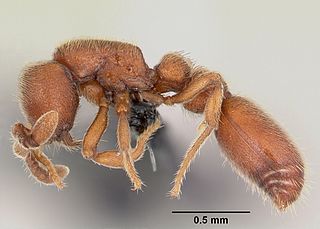
Ooceraea biroi, the clonal raider ant, is a queenless clonal ant in the genus Ooceraea. Native to the Asian mainland, this species has become invasive on tropical and subtropical islands throughout the world. Unlike most ants, which have reproductive queens and mostly nonreproductive workers, all individuals in a O. biroi colony reproduce clonally via thelytokous parthenogenesis. Like most dorylines, O. biroi are obligate myrmecophages and raid nests of other ant species to feed on the brood.

Cerapachys is a genus of ants in the subfamily Dorylinae. Species are mainly myrmecophagous ants which raid the nests of other ants for prey. The genus is distributed widely throughout the Indomalayan region. The genus was revised by BoroWiec (2016) who split a number of previously synonymized genera out of Cerapachys, leaving only 5 species in the genus.

Lioponera is a genus of ants in the subfamily Dorylinae containing approximately 74 described species. The genus is distributed widely across the Afrotropical, Australasia, Indomalaya, Malagasy, and Palearctic bioregions. Lioponera was described by Mayr (1879) and later placed as a junior synonym of Cerapachys by Brown (1975). Lioponera was resurrected as a valid genus by Borowiec (2016) during redescription of the doryline genera.

Syscia is a genus of ants in the subfamily Dorylinae containing thirty eight described species. The genus is distributed widely across the Eastern Asia, North America, and South America. Syscia was described by Roger (1861), later placed as a Cerapachys subgenus by Wheeler (1902) and then junior synonym of Cerapachys by Kempf (1972). Syscia was resurrected as a valid genus by Borowiec (2016) during redescription of the doryline genera.
Ooceraea coeca is a species of reddish-brown army ant found in Sri Lanka.
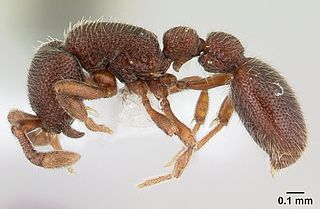
Ooceraea fragosa is a species of reddish-brown army ant found in Sri Lanka, and the type species for the genus Ooceraea.
Parasyscia luteoviger is a species of reddish-brown army ant found in Sri Lanka.

Syscia typhla is a species of reddish brown army ant found in the Sinharaja Rain Forest, Sri Lanka.

Formica gagatoides is a species of ant in the family Formicidae. It is found in Europe.

Camponotus vicinus is a species of ant in the subfamily formicinae. C. vicinus is widespread throughout western North America, from Alaska, south to Mexico, and east to Texas and Manitoba. Unlike its wood nesting "carpenter ant" relatives, Camponotus vicinus is typically found nesting in the soil under stones and other objects. The giant ants in the 1954 film Them! are identified as C. vicinus, despite multiple anatomical differences, including the presence of a sting, which is absent in Formicine ants.
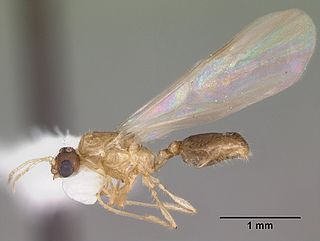
Solenopsis carolinensis, the thief ant, is a species of ant in the family Formicidae.
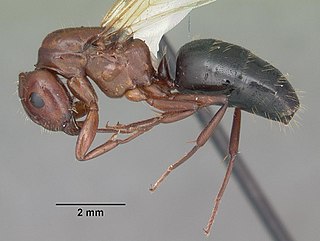
Camponotus discolor is a species of ant in the family Formicidae.
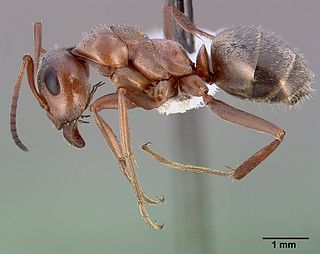
Formica aerata, the grey field ant, is a species of ant in the family Formicidae.

Myrmica incompleta is a species of ant in the family Formicidae.
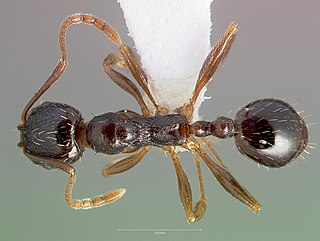
Aphaenogaster occidentalis is a species of ant in the family Formicidae.

Pogonomyrmex desertorum, the large seed harvesting ant, is a species of ant in the family Formicidae.

Proceratium silaceum is a species of ant in the family Formicidae.

Formica manni is a species of ant in the family Formicidae.















